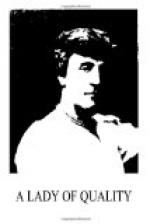“Yes, love,” she said—“yes, love—and I have prayed, my Gerald, that I may give you sons who shall be men like you. But when I give you women children, I shall pray with all my soul for them—that they may be just and strong and noble, and life begin for them as it began not for me.”
* * * * *
In the morning of a spring day when the cuckoos cried in the woods, and May blossomed thick, white and pink, in all the hedges, the bells in the grey church-steeple at Camylott rang out a joyous, jangling peal, telling all the village that the heir had been born at the Tower. Children stopped in their play to listen, men at their work in field and barn; good gossips ran out of their cottage door, wiping their arms dry, from their tubs and scrubbing-buckets, their honest red faces broadening into maternal grins.
“Ay, ’tis well over, that means surely,” one said to the other; “and a happy day has begun for the poor lady—though God knows she bore herself queenly to the very last, as if she could have carried her burden for another year, and blenched not a bit as other women do. Bless mother and child, say I.”
“And ’tis an heir,” said another. “She promised us that we should know almost as quick as she did, and commanded old Rowe to ring a peal, and then strike one bell loud between if ’twere a boy, and two if ’twere a girl child. ’Tis a boy, heard you, and ’twas like her wit to invent such a way to tell us.”
In four other villages the chimes rang just as loud and merrily, and the women talked, and blessed her Grace and her young child, and casks of ale were broached, and oxen roasted, and work stopped, and dancers footed it upon the green.
“Surely the new-born thing comes here to happiness,” ’twas said everywhere, “for never yet was woman loved as is his mother.”
In her stately bed her Grace the duchess lay, with the face of the Mother Mary, and her man-child drinking from her breast. The duke walked softly up and down, so full of joy that he could not sit still. When he had entered first, it was his wife’s self who had sate upright in her bed, and herself laid his son within his arms.
“None other shall lay him there,” she said, “I have given him to you. He is a great child, but he has not taken from me my strength.”
He was indeed a great child, even at his first hour, of limbs and countenance so noble that nurses and physicians regarded him amazed. He was the offspring of a great love, of noble bodies and great souls. Did such powers alone create human beings, the earth would be peopled with a race of giants.
Amid the veiled spring sunshine and the flower-scented silence, broken only by the twittering of birds nesting in the ivy, her Grace lay soft asleep, her son resting on her arm, when Anne stole to look at her and her child. Through the night she had knelt praying in her chamber, and now she knelt again. She kissed the new-born thing’s curled rose-leaf hand and the lace frill of his mother’s night-rail. She dared not further disturb them.




